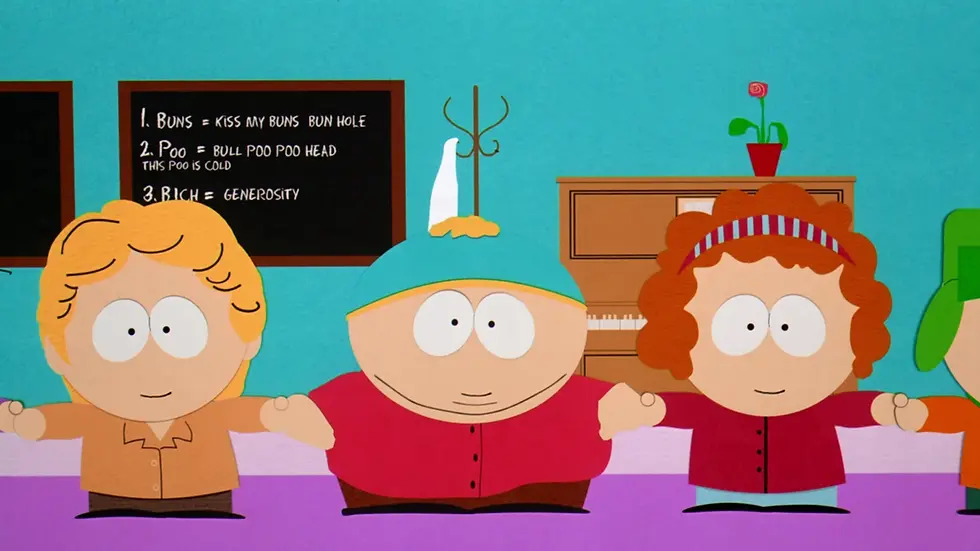South Park: Bigger, Longer & Uncut (1999)
- Soames Inscker

- Jul 22, 2025
- 3 min read

Crude, outrageous, and defiantly hilarious, South Park: Bigger, Longer & Uncut is everything its title suggests and more. Released in 1999, this feature-length adaptation of the infamous animated TV series pushes boundaries with gleeful abandon.
Directed by South Park co-creator Trey Parker, the film takes the irreverent tone of the show and amplifies it into a satirical musical that is both a sharp critique of censorship and a celebration of uninhibited free speech. Beneath its vulgarity lies a surprisingly smart and self-aware political satire, making it one of the most audacious animated films of the decade.
Plot Summary
The story begins when the foul-mouthed Canadian comedians Terrance and Phillip release their new film Asses of Fire, which the kids of South Park sneak in to see. Inspired by the film’s crude humour and profanity, Stan, Kyle, Cartman, and Kenny begin imitating it—much to the horror of their parents.
When Kenny dies (again), the controversy escalates into a full-blown moral panic led by Kyle’s mother Sheila Broflovski, resulting in a war between the United States and Canada. Meanwhile, Satan and Saddam Hussein are preparing to rise from Hell and take over the world. What starts as a simple joke about censorship snowballs into a delirious, over-the-top parody of war, nationalism, religion, and authoritarianism.
Satire and Social Commentary
On its surface, South Park: Bigger, Longer & Uncut is a foul-mouthed cartoon full of toilet humour and musical numbers about expletives. But under its anarchic humour lies a scathing satire of American culture, particularly the hypocrisy of censorship, the moral panic surrounding media violence, and the absurdity of reactionary politics.
The film pokes fun at everything from parental overreach and government overreaction to Hollywood hypocrisy and international diplomacy. It’s no accident that the war between the U.S. and Canada begins over a movie filled with swear words—this is Parker and Stone’s pointed commentary on how society often targets art instead of addressing deeper issues.

Characters and Performances
Trey Parker voices Stan, Cartman, and Satan, among others, showcasing his vocal range and comedic timing.
Matt Stone voices Kyle and Kenny (among others) and provides a grounded counterpoint to Parker’s zaniness.
Mary Kay Bergman (in one of her final roles) voices nearly all the female characters with incredible versatility.
Isaac Hayes returns as Chef, offering soulful wisdom and suggestive lyrics in equal measure.
Each character is exaggerated for comic effect, but they’re also given small moments of depth—Stan's romantic longing for Wendy, Kyle’s struggle with his identity, and even Satan’s dysfunctional relationship with Saddam are played with unexpected sincerity.
Music and Songs
One of the film’s greatest strengths is its original musical score, which cleverly satirises Broadway-style show tunes. The songs, composed by Trey Parker and Marc Shaiman, are as catchy as they are profane. Highlights include:
“Uncle F*a”** – A gleefully obscene anthem that ignites the plot.
“Blame Canada” – A rousing satire of scapegoating, which was nominated for an Academy Award.
“La Resistance (Medley)” – A grand musical climax in the style of Les Misérables, blending various themes and characters in a dazzling number.
“What Would Brian Boitano Do?” – An absurdly inspiring anthem of action and absurdity.
The songs parody the structure of classic musicals while pushing the limits of taste, making them both parody and homage.
Animation and Style
The animation remains intentionally crude, mimicking the cutout-paper style of the TV series. But what it lacks in polish, it makes up for in energy and creativity. The use of bright colors, fast-paced editing, and over-the-top visual gags keeps the film lively. The exaggerated violence, Hell sequences, and musical staging show a level of cinematic ambition that surpasses expectations for a film based on a cartoon show known for its simplicity.
Reception and Legacy
South Park: Bigger, Longer & Uncut was a critical and commercial success. It shocked some audiences but was widely praised for its fearless satire and creative boldness. It has since become a cult classic and is often ranked among the best animated films—and musicals—of the late 20th century.
Its impact on both animated filmmaking and the free speech debate is significant. It showed that animation could be a vehicle for sharp political and cultural commentary, and it paved the way for other adult-oriented animated films and series.
Conclusion
South Park: Bigger, Longer & Uncut is not for the easily offended, but for those willing to embrace its wild, profane energy, it’s a brilliantly subversive and wickedly funny film. It skewers censorship, nationalism, and moral hypocrisy with sharp wit and unforgettable songs. Far more than a crude cartoon, it’s a cleverly constructed satire wrapped in vulgar hilarity—exactly what its creators intended.
Rating:
Outrageous, fearless, and surprisingly smart—this is satire at its most musical and most unapologetically obscene.






